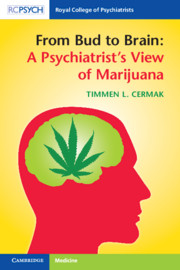Book contents
- From Bud to Brain: A Psychiatrist’s View of Marijuana
- From Bud to Brain: A Psychiatrist’s View of Marijuana
- Copyright page
- Dedication
- Contents
- Foreword
- Acknowledgments
- Introduction
- Section 1 The Science of Marijuana and the Brain
- Section 2 The Science and Art of Healing
- Chapter 10 Cannabinoid-Based Medication
- Chapter 11 Understanding and Encouragement
- Chapter 12 Principles of Motivational Interviewing
- Chapter 13 Treatment of Regular Heavy Marijuana Users
- Section 3 The History and Art of Marijuana Policy
- Section 4 Epilogue
- Index
Chapter 12 - Principles of Motivational Interviewing
from Section 2 - The Science and Art of Healing
Published online by Cambridge University Press: 31 March 2020
- From Bud to Brain: A Psychiatrist’s View of Marijuana
- From Bud to Brain: A Psychiatrist’s View of Marijuana
- Copyright page
- Dedication
- Contents
- Foreword
- Acknowledgments
- Introduction
- Section 1 The Science of Marijuana and the Brain
- Section 2 The Science and Art of Healing
- Chapter 10 Cannabinoid-Based Medication
- Chapter 11 Understanding and Encouragement
- Chapter 12 Principles of Motivational Interviewing
- Chapter 13 Treatment of Regular Heavy Marijuana Users
- Section 3 The History and Art of Marijuana Policy
- Section 4 Epilogue
- Index
Summary
Clinicians who hope to modify patients’ unhealthy use of marijuana face potential frustration and difficulty trying to engage people in meaningful dialogue. The stages of change outlined by Prochaska and Di Clemente provide a useful guide for understanding how to initiate conversation with someone addicted to marijuana, whether they are in the precontemplation, contemplation, preparation (for change), action or maintenance stage. Utilizing the stages of change to guide the approach to promoting behavioral change introduces clinicians to one of the most essential principles of motivational interviewing (MI), often described as “meeting patients where they are”. Developed by Miller and Rollnick, MI shifts the focus away from resistance and denial in order to focus instead on ambivalence and moves clinicians away from confrontation and toward a more collaborative approach that is less likely to stimulate a patient’s defenses. Engagement through empathy for patients’ suffering enables clinicians to increase the cognitive dissonance between their behavior and their goals. Ultimately, the practice of motivational interviewing is an art, and not merely a set of techniques, that requires clinicians to explore their fundamental attitudes toward addiction.
Keywords
- Type
- Chapter
- Information
- From Bud to Brain: A Psychiatrist's View of Marijuana , pp. 174 - 183Publisher: Cambridge University PressPrint publication year: 2020

